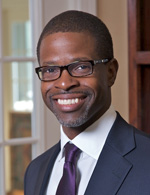Leaders need to motivate people, but churches do not have quite the same economic leverage as corporations to motivate employees to do their best work consistently and to reward them for a job well done. A church’s equivalent of the end of year bonus or promotion pales in comparison -- or flat out doesn’t exist.
But motivation is integral to vocation -- not just to professional ministry, but equally, and perhaps just as pressing in our day, lay ministry. So it’s worth asking: How do we faithfully motivate laity and clergy for faithful ministry?
First, let’s admit that church metrics are difficult to measure, so it makes sense that a reward system based on them would be too. The number of people who join a church is an important statistic, but that figure does not equate to the number of people who have matured as disciples in the past year. The attendance at a family night dinner does not tell us how well our families are doing in the areas of unconditional love, forgiveness and “speaking the truth in love” to one another.
But without motivation to nurture discipleship and welcome new people into the church, faith communities will not thrive. We have seen what happens when people we care about lack motivation to act in their own best interest or in the interest of others -- including their own church community.
I listened to a Dan Pink TED talk recently in which he discussed several experiments that produced interesting findings about motivation. In one experiment Group A was promised money by performing a task faster than Group B. Group B was only told that their speed was going to be used to establish a norm for the test. Surprisingly, Group A took 3 ½ minutes longer on average to complete the task than Group B.
Pink went on to cite studies that found that extrinsic motivators for certain kinds of complex tasks actually decreased performance. With tasks that called for “rudimentary cognitive skill”, a larger reward actually led to poorer performance.
It’s part of church culture to say that money is never the sole motivator for our vocation. And here, Pink shows us the social science seems to suggest that’s just as true in the corporate world.
Yet the church is a community of faith where generosity at its best is an outward expression of an ontological transformation. Are we taking a risk when we compensate people for their acts of kindness and service?
What’s fascinating is how Pink uses these social science experiments to show that “if-then” rewards often stifle creativity. This does not mean that money does not matter -- because it does. It’s just that people really want to do work that matters and work that is interesting. And they want to do it in an environment where they have autonomy, mastery and purpose. They want to know they are making a difference. For the church it may be more significant to help people see the impact of their generosity than it is to compensate them. It's a stronger motive to do creative, life-giving work than money alone.
So the question for the church becomes how we go about nurturing cultures where people believe that what they do actually does matter -- where their gifts become occasions for grace and life and transformation; their labors, acts of discipleship and worship and restitution.
What a marked difference that is to showing up on Sunday, singing a few songs and putting a check in the offering plate.
People want to live lives of meaning and significance. This is what the church can do better than any other institution because we are ambassadors of the God’s reign.
Prince Raney Rivers is pastor of United Metropolitan Missionary Baptist Church in Winston-Salem, North Carolina.











